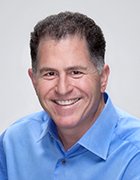Dell: VMware spinoff would have 'no change for customers'
Dell CEO Michael Dell says customers aren't concerned about his company's plan to possibly spin off VMware shares; VMware's CEO says the companies will continue to 'R&D together.'
Michael Dell clarified this week that his company intends to keep control of VMware even if it spins off some of its stock. He said selling shares will not affect the companies' products and technologies.
VMware CEO Pat Gelsinger and other Dell executives said the two companies' development efforts remain inextricably linked. Michael Dell said during a news conference at Dell Technologies World 2020 that no VMware spinoff of shares would involve selling it to a third party. Dell Technologies has filed statements to the Securities and Exchange Commission that said it is looking to spin off some or all of its 81% stake in the virtualization giant.
"We're not selling VMware, we're not looking for a buyer," Michael Dell said. "We filed a form that says we are exploring taking the shares that Dell Technologies owns, and distributing them directly to our shareholders. Our shareholders would then own those shares. Nothing changes for our customers, nothing changes with our strategy, or the technology innovation that we've been driving together, the joint product development. I think the key message is, no change for customers."
 Michael Dell
Michael Dell
Dell added about the possible VMware spinoff, "I understand the media's interested in this, but in my conversations with customers, that really doesn't come up."
Gelsinger and Dell chief operating officer Jeff Clarke emphasized the importance joint development plays in their technologies. This includes VMware's Tanzu and Monterey initiatives, its 5G strategy, VMware Cloud Foundation and Workspace One. The collaboration extends to Dell's Project Apex IT-as-a-service vision disclosed this week at Dell Tech World.
If Dell gave up control of VMware technology, it could leave a hole in many of its products and services. VMware virtualization is a key part of Dell's cloud strategy and plays a role in several Dell EMC storage products, including its VxRail hyper-converged infrastructure.
"Probably the most important thing is how we R&D together," Gelsinger said of the Dell-VMware relationship. "We're making sure we have a model to continue that on the other side of the spin."
Clarke said he and Gelsinger met this week to discuss joint development across their product lines.
"I think it's just indicative of the kind of substrate and fabric that we built across the organization," he said. "To continue this innovation and integration, we spend time with our collective teams talking about next-generation data and architectures, Tanzu and modern applications, 5G telco and our joint efforts. So this work is alive and thriving today, and Pat and I don't think it changes going forward. In fact, it's not going to change."
 Pat Gelsinger
Pat Gelsinger
Gelsinger predicted that Project Monterey, which rolled out at the VMworld virtual conference last month, would have a positive impact on hardware and help Dell's networking, server and storage businesses. Monterey is the next generation of VMware's vSphere virtualization platform. It will use specialized hardware to manage functionality such as networking, security and artificial intelligence.
"I'll say Project Monterey is one of the most geeky things that we're going to do," Gelsinger said. "Being an old hardware guy, like Jeff and Michael -- we're going to have a lot of fun."
Dell acquired VMware as part of its $67 billion acquisition of storage giant EMC in 2016. EMC spun VMware into a public company in 2007 but maintained controlling interest in 85% of its shares. Dell kept VMware as a public company, but it has considered changing the ownership structure.
Michael Dell in July confirmed reports that his company is exploring spinning off some or all its ownership stake in VMware. Earlier news reports said one option of a VMware spinoff was a sale of VMware to a third party, although such a move could leave Dell without much of its key software and virtualization technologies.







